HYMNS OF SPIRITUAL WARFARE
HYMNS OF SPIRITUAL WARFARE
ONWARD CHRISTIAN SOLDIERS
Sabine Baring-Gould, 1865
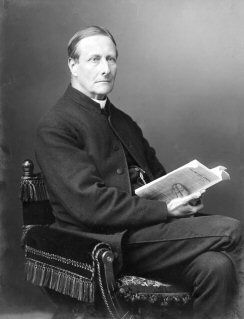
Rev. Sabine Baring-Gould of Lew Trenchard in Devon, England, was an Anglican priest, hagiographer, antiquarian, novelist, folk song collector and eclectic scholar. His bibliography consists of more than 1240 publications, though this list continues to grow. His family home, the manor house of Lew Trenchard, near Okehampton, Devon, has been preserved as he had it rebuilt and is now a hotel. He is remembered particularly as a writer of hymns, the best-known being “Onward, Christian Soldiers” and “Now the Day Is Over”. He also translated the carol “Gabriel’s Message” from the Basque language to English.
Onward, Christian soldiers, marching as to war,
With the cross of Jesus going on before.
Christ, the royal Master, leads against the foe;
Forward into battle see His banners go!
Refrain:
Onward, Christian soldiers, marching as to war,
With the cross of Jesus going on before.
At the sign of triumph Satan’s host doth flee;
On then, Christian soldiers, on to victory!
Hell’s foundations quiver at the shout of praise;
Brothers, lift your voices, loud your anthems raise.
Like a mighty army moves the church of God;
Brothers, we are treading where the saints have trod.
We are not divided, all one body we,
One in hope and doctrine, one in charity.
Crowns and thrones may perish, kingdoms rise and wane,
But the church of Jesus constant will remain.
Gates of hell can never ’gainst that church prevail;
We have Christ’s own promise, and that cannot fail.
Onward then, ye people, join our happy throng,
Blend with ours your voices in the triumph song.
Glory, laud, and honor unto Christ the King,
This through countless ages men and angels sing.
AM I A SOLDIER OF THE CROSS
Isaac Watts, pub.ca.1721
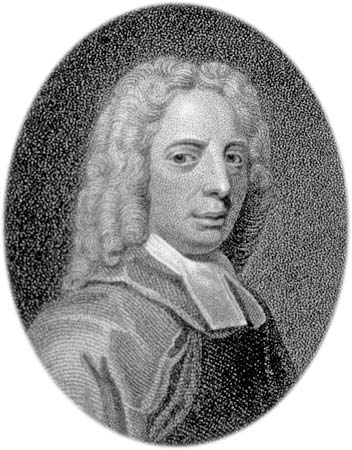
Isaac Watts was an English Christian minister, hymn writer, theologian, and logician. He was a prolific and popular hymn writer and is credited with some 750 hymns. He is recognized as the “Father of English Hymnody;” many of his hymns remain in use today and have been translated into numerous languages.
Am I a soldier of the cross,
A follow’r of the Lamb?
And shall I fear to own His cause,
Or blush to speak His name?
Must I be carried to the skies
On flow’ry beds of ease,
While others fought to win the prize,
And sailed through bloody seas?
Are there no foes for me to face?
Must I not stem the flood?
Is this vile world a friend to grace,
To help me on to God?
Sure I must fight if I would reign;
Increase my courage, Lord;
I’ll bear the toil, endure the pain,
Supported by Thy Word.
Thy saints in all this glorious war
Shall conquer, though they die;
They see the triumph from afar,
By faith’s discerning eye.
When that illustrious day shall rise,
And all Thy armies shine
In robes of vict’ry through the skies,
The glory shall be Thine.
THE FIGHT IS ON
Lelia N. Morris, 1905
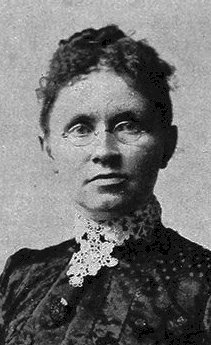
Lelia Naylor Morris was an American Methodist hymnwriter. Some sources give her first name as Leila, but Lelia seems more likely to be correct. She is sometimes known as Mrs. Charles H. Morris, as C. H. Morris, or as C. H. M., having adopted her husband’s forenames upon marriage after the custom of the time.
The fight is on, the trumpet sound is ringing out,
The cry “To arms!” is heard afar and near;
The Lord of hosts is marching on to victory,
The triumph of the Christ will soon appear.
Refrain:
The fight is on, O Christian soldier,
And face to face in stern array,
With armor gleaming, and colors streaming,
The right and wrong engage today!
The fight is on, but be not weary;
Be strong, and in His might hold fast;
If God be for us, His banner o’er us,
We’ll sing the victor’s song at last!
The fight is on, arouse, ye soldiers brave and true!
Jehovah leads, and vict’ry will assure;
Go buckle on the armor God has given you,
And in His strength unto the end endure.
The Lord is leading on to certain victory;
The bow of promise spans the eastern sky;
His glorious Name in every land shall honored be;
The morn will break, the dawn of peace is nigh.
SLEEP NOT, SOLDIER
Elizabeth C. Gaskell, pub.1848
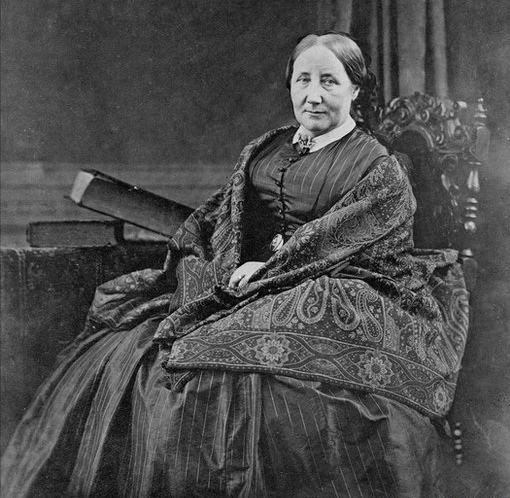
Elizabeth Cleghorn Gaskell was often referred to as Mrs Gaskell, was an English novelist and short story writer. Her novels offer a detailed portrait of the lives of many strata of Victorian society, including the very poor, and are of interest to social historians as well as lovers of literature. Her first novel, Mary Barton, was published in 1848. Gaskell’s The Life of Charlotte Brontë, published in 1857, was the first biography of Brontë. Some of Gaskell’s best known novels are Cranford (1851–53), North and South (1854–55), and Wives and Daughters (1865).
Sleep not, soldier of the cross,
Foes are lurking all around;
Look not here to find repose;
This is but thy battleground.
Up! and take thy shield and sword!
Up! it is the call of Heav’n;
Shrink not faithless from thy Lord;
Nobly strive, as He hath striv’n.
Break through all the force of ill;
Tread the might of passion down;
Struggling onward, onward still,
To thy conqu’ring Savior’s crown.
Through the midst of toil and pain,
Let this thought ne’er leave thy breast;
Every triumph thou dost gain
Makes more sweet thy coming rest.
THY SOLDIER I WILL BE
Anonymous/Unknown, pub.1922
The die is cast, my choice is made,
A soldier I will be;
Where Jesus leads I’m not afraid,
A soldier I will be.
In any clime, in any place,
E’en can I not my Savior trace,
To spread the news of Jesus’ grace,
A soldier I will be.
Refrain:
I’ll follow Thee, my Savior,
No matter where it be;
I’ll follow Thee, my Savior,
O’er mountain, vale, or sea;
I’ll follow Thee, my Savior,
You can depend on me:
In joy or pain, in loss or gain,
Thy soldier I will be.
In spite of sorrow, toil, or pain,
A soldier I will be;
I’ll bear the cross, despise the shame,
A soldier I will be.
I know no color, class, or state,
But cry, “Repent, ere ’tis too late!”
And save lost souls from hell’s sad fate,
A soldier I will be.
Until I draw my latest breath
A soldier I will be;
And when my eyes shall close in death,
A soldier I will be.
And when I reach those gates of pearl,
I’ll sheath my sword, my colors furl,
Defiance at the foe I’ll hurl,
A soldier I will be.
I’M A SOLDIER BOUND FOR GLORY
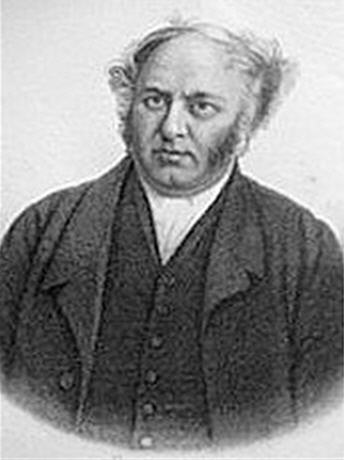
Richard Jukes
Rev. Richard Jukes (1804–1867) was a popular Primitive Methodist minister and hymn writer. After coming to Christ in 1825, Jukes was a lay speaker, then served as a Primitive Methodist minister for 32 years, retiring in 1859. Many of his texts appeared in 1862, in The Book That Will Cheer You: or, Hymns for the Living and the Dying. His biography, The Poet of Milton, by James Pritchard, appeared in 1868.
I’m a soldier bound for glory,
I’m a soldier going home;
Come and hear me tell my story—
All who love the Savior, come.
Refrain:
I love Jesus, hallelujah!
I love Jesus, yes, I do, I do;
I love Jesus, He’s my Savior;
Jesus smiles and loves me too.
I will tell you what induced me
In the glorious fight to start:
’Twas the Savior’s loving-kindness
Overcame and won my heart.
When I first commenced my warfare,
Many said, “He’ll run away”;
But their words have been unfounded—
In the fight I am today.
I’m “a wonder unto many,”
God alone the change has wrought;
Here I raise my Ebenezer,
Hither by His help I’m brought.
When to death’s dark, swelling river,
Like a warrior I shall come,
Then I mean to shout “Salvation!”
And go singing “glory!” home.
A SALVATION SOLDIER
Frederick Booth-Tucker, pub.1922
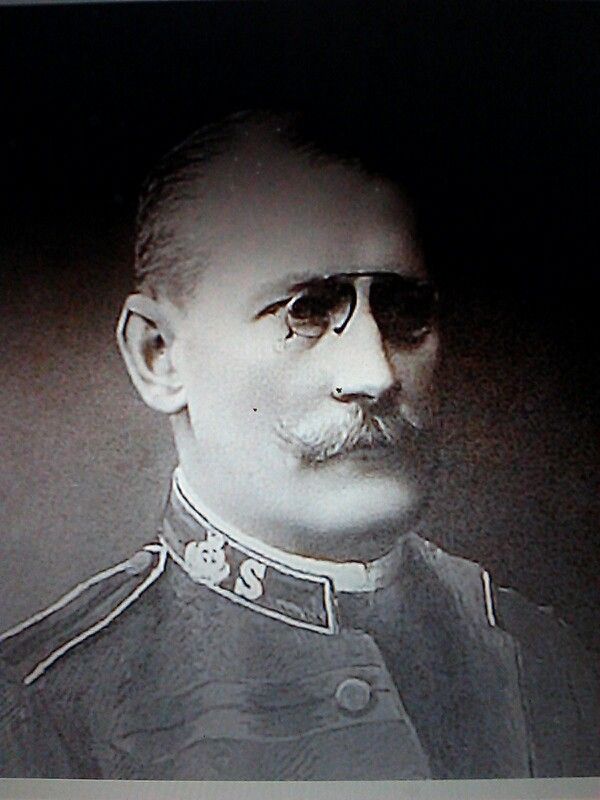
Commissioner Frederick St. George de Lautour Booth-Tucker, OF was a senior Salvation Army officer of the late nineteenth and early twentieth centuries, and the son in law of General William Booth, the Army’s Founder.
God’s trumpet is sounding, “To arms!” is the call,
More warriors are wanted to help on the war;
My King’s in the battle, He’s calling for me,
A salvation soldier for Jesus I’ll be.
On land and on water my colors I’ll show,
Through ten thousand battles with Jesus I’ll go;
In danger I’m certain He’ll take care of me,
His blood-and-fire soldier forever I’ll be.
When foes persecute me I’ll not be dismayed—
Sin, death, hell, and fiends shall not make me afraid;
From fearing and doubting I’m fully set free,
A salvation soldier for God I will be.
I’ll fight to the last with the Lord’s sword and shield,
And count it an honor to die in the field;
In death and the grave there is vict’ry for me,
A salvation soldier in glory I’ll be.
SOLDIER, ROUSE THEE!
attr. to George S. Railton, pub.1874
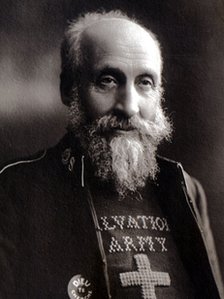
George Scott Railton was a Scottish-born Christian missioner who was the first Commissioner of The Salvation Army and second in command to its Founder General William Booth.
Soldier, rouse thee! War is raging,
God and fiends are battle waging—
Every ransomed pow’r engaging,
Break the tempter’s spell.
Dare ye still lie fondly dreaming,
Wrapt in ease and worldly scheming,
While the multitudes are streaming
Downwards into hell?
Refrain:
Through the world resounding,
Let the gospel sounding,
Summon all, at Jesus’ call
His glorious cross surrounding.
Sons of God, earth’s trifles leaving,
Be not faithless but believing,
To your conqu’ring Captain cleaving,
Forward in the fight.
Lord, we come, and from Thee never
Self nor earth our hearts shall sever;
Thine entirely, Thine forever,
We will fight and die.
To a world of rebels dying,
Heav’n and hell and God defying,
Everywhere we’ll still be crying,
“Will ye perish—why?”
Hark! I hear the warriors shouting,
Now the hosts of hell we’re routing;
Courage! Onward! Never doubting,
We shall win the day.
See the foe before us falling,
Sinners on the Savior calling,
Throwing off the bondage galling—
Join our glad array.
HAVE YOU PRAYED ALL NIGHT
TILL THE BREAK OF DAY
Author: William C. Poole 1915 (Three Verses)
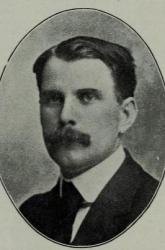
William C. Poole was born and raised on a farm in Maryland. His parents belonged to the Methodist church. He graduated from Washington College and became a Methodist minister in Wilmington, Delaware area. He was pastor of McCabe Memorial, Richardson Park and other churches. In 1913 he was superintendent of the Anti-Saloon League of Delaware. He wrote about five hundred hymns. The writing was done as recreation and a diversion from his pastoral work. His goal in writing as well as in being a minister was to help people.
Have you prayed all night, till the break of day,
And the morning light drove the dark away?
Did you linger there, till the morning dew,
In prevailing prayer, did you pray it through?
Refrain
Did you pray till the answer came,
Did you plead in the Savior’s name?
Have you prayed all night till the morning light,
Did you pray till the answer came?
Did you pray it through, till the answer came?
There’s a promise true for your faith to claim,
At the place of prayer, Jesus waits for you,
Did you meet Him there, did you pray it through? [Refrain]
As the Master prayed in the garden lone,
Let your prayer be made to the Father’s throne,
If you seek His will, He will answer you,
Are you trusting still, have you prayed it through? [Refrain]
WHAT VARIOUS HINDRANCES WE MEET
William Cowper 1779 (Two verses)
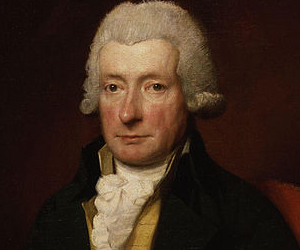
William Cowper (1731 – 1800 was an English poet and hymnodist. One of the most popular poets of his time, Cowper changed the direction of 18th century nature poetry by writing of everyday life and scenes of the English countryside. After being institutionalized for insanity in the period 1763–65, Cowper found refuge in a fervent evangelical Christianity, the inspiration behind his much-loved hymns. He continued to suffer doubt and, after a dream in 1773, believed that he was doomed to eternal damnation. He recovered and wrote more religious hymns. His religious sentiment and association with John Newton (who wrote the hymn “Amazing Grace”) led to much of the poetry for which he is best remembered, and to the series of Olney Hymns. His poem “Light Shining out of Darkness” gave English the phrase: “God moves in a mysterious way/His wonders to perform.”
Prayer makes the darkened cloud withdraw,
Prayer climbs the ladder Jacob saw;
Gives exercise to faith and love,
Brings every blessing from above.
Restraining prayer, we cease to fight;
Prayer makes the Christian’s armor bright;
And Satan trembles, when he sees
The weakest saint upon his knees.